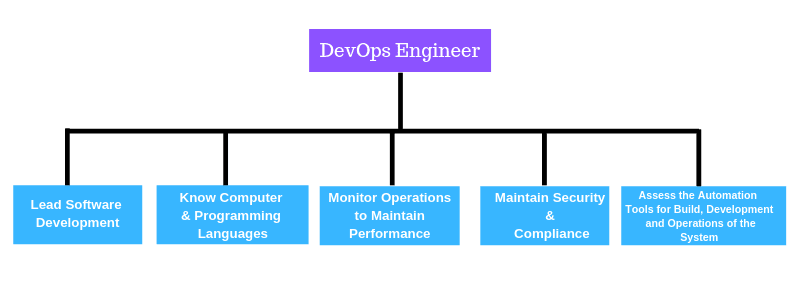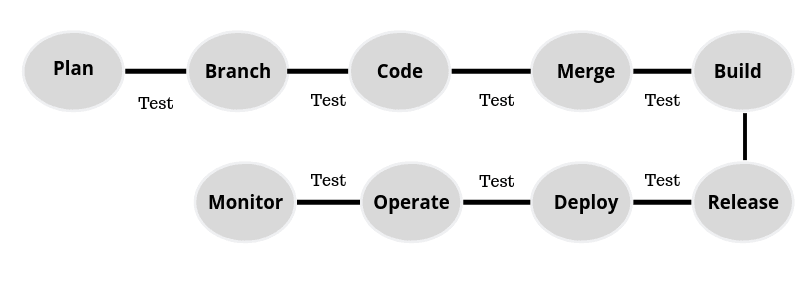How to Become a DevOps Engineer ?
The software development cycle involves a lot of steps and takes time. DevOps is a practice that aims to reduce the time taken for the software development cycle to complete. The key for DevOps is “Automation”. DevOps practices work well with agile and continuous delivery methodologies, making the software ready to be released in very little time. With the use of DevOps, there is continuous improvement in systems delivery, creativity, and knowledge. Software developers can thus achieve more growth using these practices.
How to Become a DevOps Engineer?
While DevOps is a practice, it is often used as a job title nowadays because it involves knowledge of various stages of the software development lifecycle.
DevOps is a combined term of Dev (development) and Ops (operations). Some of the benefits of DevOps practices are –
- Product or software is always ready to be released to the market.
- There are faster feedback and improvement
- The throughput is better
- Risks involved are less
Roles and responsibilities of DevOps engineer
Before we get into how to become a DevOps engineer, we should be clear with what a DevOps engineer does. Just like a software engineer, DevOps engineers can create code for the application, however, DevOps engineers also take care of build, deployment, and operations as a continuous automated process after the code is developed. They work in tandem with business folks and manage the entire workflow to make the software work by integrating it with the automated processes.

Much of the daily work is related to build and deployment, communicating the results to respective teams, automation, and configuration. However, programming is needed to bridge the gap between the development and the operations team, if need be.
Skill Set required to become a DevOps engineer
There are certain must-have skills that one must possess to become a DevOps engineer. Don’t be overwhelmed by the long list, you need not have all of them at once, rather can gain some skills with experience. You can start with one or two of these –
Programming knowledge
The competition and peer pressure are always high for the positions of DevOps engineer and if you have to stay ahead, you will have to do the extra bit. Learning few coding languages like Python, Java, Ruby or similar can put you in a better position than being just the network or IT person. You will be able to debug chunks of code if the need is, resolve build and deployment errors so that the development lifecycle doesn’t have to bounce back between development and deployment, thus saving time and resources. Since most of the processes like server trigger, application installation, configuration, validation, etc are automated, DevOps engineer has a huge responsibility of running things smoothly and fill the gaps. Knowledge of programming can be applied to build tools that will help automate various processes.
Know what a system administrator knows
A system administration has a lot on his plate. He is responsible for the build, deployment, testing, debugging and fixing servers on a day to day basis. He checks the health of the system regularly and works on critical issues. Additionally, DevOps professionals should work on automating the most important parts of the server and infrastructure deployment process. This is one of the most important skills of a DevOps engineer.
Network and storage
Since DevOps professionals deal with a lot of servers, connections, data, and storage, they should be able to manage network issues. This means they should know the IT network and storage concepts. Basic networking knowledge should be good enough, however as you work with real-time systems, you should get familiar with various protocols, APIs and capacity decisions to support the infrastructure required.
This also means that a network engineer who has some knowledge of server maintenance can easily become a DevOps engineer with a little upskilling. To start with, try to attain scripting knowledge and learn various configuration and deployment tools. Get yourself equipped with Linux, OpenStack and any public cloud like Azure, AWS. Continuous integration (with Jenkins/Kubernetes) is another area you should look at learning for long-term.
Infrastructure management and compliance
New systems can follow the DevOps workflow. However, legacy systems need to be attended and brought into the DevOps world. These systems should be configured to be secure, scalable, balanced, have proper backups and compliant. All this should happen without disturbing any of the existing enterprises. In short words, the tasks that were done manually, have to be automated. The process might break or affect some functionality. As a result, a DevOps engineer needs to be aware of cluster management software and containerization to ensure smooth integration of existing systems and new deployments.
Automation tools
The most popular DevOps tools out of the many available DevOps automation tools are Puppet, Kubernetes and Jenkins. Automation is the ultimate goal of the DevOps process. From generating code to building, testing, and deployment, every task has to be automated. The monitoring and post-production testing also automated providing continuous integration and faster results. The DevOps pipeline consists of Continuous Integration, Continuous testing and continuous deployment which is a recurring process.
Further, infrastructure set up, software deployment and configurations can also be automated, thus enhancing speed, reliability, consistency and most importantly a number of accurate deliveries. Knowledge of any of the automation tools will go a long way for a successful DevOps career.
Virtualization and cloud
Virtualization means running a virtual instance of a computer system in a separate layer abstracted from the actual hardware. Virtualization allows a large system to be split into smaller ones so that the server can be utilized by a greater number of users or applications having different requirements. It also keeps any program on one machine isolated from the others.
This makes virtualization quite important for DevOps. Imagine if we can virtualize the hardware and create a copy of the existing network, the dev team, and the ops (IT) team can work together and be in sync. This will also provide a seamless testing interface.
Network virtualization requires knowledge of public, private, and hybrid clouds. Not too deep, but a basic working understanding is definitely useful.
Security
The overall security of a DevOps environment involves certain practices built through various policies, strategies, and techniques. Security is integral to every stage of the DevOps cycle be it development, testing, build, deployment or monitoring. Each stage carries some risks with it. For example, most deployments are done in a cloud environment, hence cloud security considerations should be taken care of. Same way, containers and the tools that are used to manage them – like Docker, Kubernetes, etc… come with their own set of vulnerabilities. As a DevOps engineer, you should what privileges should be given to different accounts – root, admin, developer, etc… Additionally, you should be able to:
- create and enforce policies that are easy to comprehend and follow by the team members,
- automate the security processes,
- manage and control privileged access, remove dormant accounts and enforce least possible privileges unless absolutely required,
- introduce security in early phases of the development lifecycle so that it can be reinforced during all stages.
Testing
If you are familiar with agile methodologies, you would know that agile follows an incremental and iterative development process. Testing and development move hand in hand. DevOps is just one step further. Testers don’t just test functionality, they test every aspect – operations, performance, security, and analysis of data and logs. Testing happens at every stage beginning from planning, branching, coding, merging, building, releasing, deployment, operations, and monitoring. There are plenty of tools available for a DevOps engineer to perform continuous testing and integration.

Good communication skills
Last but not least, good communication skills are essential for a DevOps engineer. That’s because he is a mediator between IT and development teams and needs to coordinate both well. Further, as a DevOps engineer, you will always be a part of a large team so there will be a lot of interaction and discussions. Communicating the right points at the right time is the key to effective communication. Having this skill can land you any job, not just that of a DevOps engineer.
Moving on
The list seems exhaustive and endless, isn’t it? As we mentioned, you can be an expert in one area and not know about others. That’s perfectly fine. Basic knowledge of each of these skills should be a good start. For example, if you are a software engineer, you most certainly are good at programming. It shouldn’t be hard for you to handle the job of an admin as you might have done some of the activities in a development environment. Same way, if you are a network engineer, you would not have trouble learning about security, virtualization and infrastructure management. Each of these skills is related. The journey to becoming a DevOps engineer is long and tedious, but it is totally worth it – and there are no shortcuts! If you land the job of a DevOps engineer, you are sure to get a good career growth and an unmatched salary package!
Know more information from live experts DevOps Online Course





No comments: